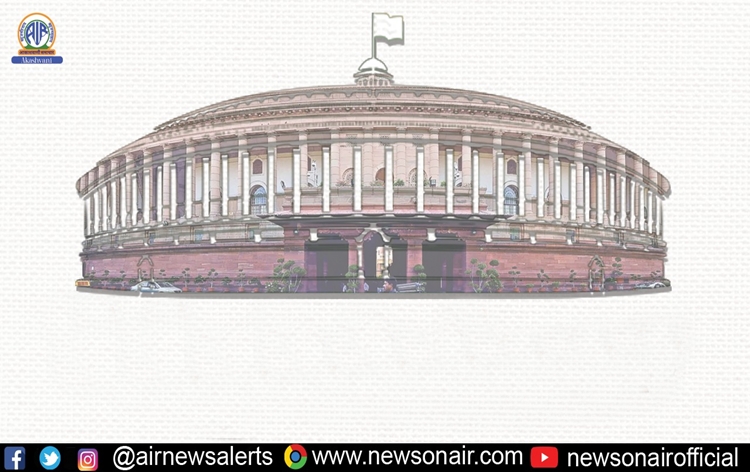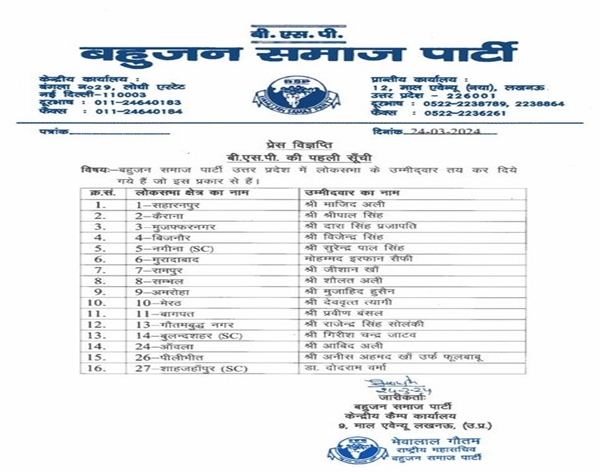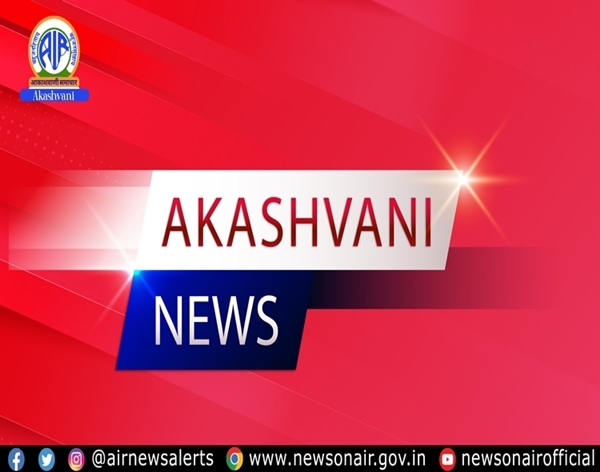Parliament has passed three Bills -The Multi-State Cooperative Societies (Amendment) Bill, 2023, the Mediation Bill and the Biological Diversity (Amendment) Bill, 2023 with the Rajya Sabha adopting them today. The Lok Sabha passed them on 25th of July, 2023.
The Cooperative Societies Bill seeks to strengthen cooperatives by making their functioning more transparent, introducing a system of regular elections and prohibiting appointment of related persons in cooperatives.
The Mediation Bill seeks to halve the maximum timeline for completing mediation proceedings from 360 to 180 days. The Bill was passed with a voice vote in the upper house.
The Biological Diversity (Amendment) Bill-2023 has provisions for sharing benefits of biodiversity commerce with locals and decriminalises biodiversity-related offences.
Law Minister Arjun Ram Meghwal said that India is a signatory to Singapore Mediation Convention and it is a big economy that has taken the lead in this direction.
The Minister said under this we are making the Mediation Council of India. This is a neutral third party and a medium of low cost. This bill makes the process a time-bound mechanism which saves time and money for different parties. The bill makes pre-litigation mediation voluntary instead of mandatory.
Earlier, Minister of State Cooperation B L Verma moved the Multi-State Cooperative Societies (Amendment) Bill, 2023 as the house sat at 2 PM.
The opposition members, however, staged a walkout from the house over their demand for a statement from the Prime Minister on the Manipur issue and followed by a comprehensive discussion under rule 267.
The opposition members staged a walkout twice from the upper house as they did so earlier during question hour over their demand on the Manipur issue.
Chairman Jagdeep Dhankhar told the opposition members to introspect as the country, which had great expectations from them, was watching them outside.
Replying to queries on the Cooperatives bill, the Minister said that the bill provides for norms for appointment of employees, which ensures that there is no nepotism practices.
He said that India's target of becoming a 5-trillion dollar economy cannot be achieved without the progressive role of the cooperative sector.
Noting that there is a limit for the private sector on employment generation, he said that the cooperative sector can spur jobs as the government is strengthening them by expanding their sphere of work into areas like LPG and petrol pump dealerships.
The Bill seeks to establish a 'Cooperative Election Authority' with a view to introduce electoral reforms in the cooperative sector.
As per the data published by the National Cooperative Union of India there are about 8.6 lakh cooperatives in the country, out of which active Primary Agricultural Cooperatives are around 63,000.
In January, the government had decided to establish three new multi-state cooperative societies to promote organic products, seeds and exports.
As per the statement of objects and reasons of the Bill, a new clause has been ed to set up the Cooperative Rehabilitation, Reconstruction and Development Fund for revival of sick multi-state cooperative societies.
The bill also provides for concurrent audit for multi-state cooperative societies, mechanism for redressal of complaints, appointment of one or more cooperative ombudsman and cooperative information officer.
Further, it provides for an increase in monetary penalties that will be imposed on these societies in case of contravention of the provisions.
Earlier, the Opposition members of the Indian National Developmental Inclusive Alliance (I.N.D.I.A.) bloc staged a walkout from the Rajya Sabha twice over their demand for a statement by Prime Minister Narendra Modi on the Manipur issue along with a comprehensive discussion.
The Upper House saw vociferous slogans shouting since morning as the Opposition members kept demanding a discussion on the Manipur issue under Rule 267.
Chairman Dhankhar said that he has already taken a decision and accepted the notices of some members under rule 176 on a short duration discussion and accused the opposition members of losing an opportunity in not discussing the Manipur situation. He said the country, which has big expectations from them, was watching their behaviour outside and they should discuss the Manipur situation as he was ready to relax the rule for a short duration discussion and continue the debate for as long as they want.
But, opposition members who continue to raise slogans during the question hour staged a walkout from the house. They again staged a walkout when the house met again at 2 PM during the post-lunch period.
Earlier during the Question Hour, Leader of Opposition Mallikarjun Kharge was not allowed to speak on the issue and the entire Opposition parties staged a walkout.
During the post-lunch, Kharge was allowed to speak during a discussion on the Multi-State Cooperative Societies (Amendment) Bill, he questioned why the prime minister was not present in the house.
When members insisted on their demand for a discussion on Manipur under rule 267, the Chairman told that the minimum respect they can show by a sense of propriety and decorum is to believe in the decision of the Chair.
He said."I have indicated to them on a number of occasions, their demand that the Prime Minister be here, does not have any Constitutional premise,".
The chairman also mentioned that he took no time in accepting the notice under Rule 176 for a short duration discussion on the Manipur issue, but the Opposition did not avail the opportunity and they want discussion under Rule 267.
He said, "In the process they want to revisit my decision, which I had declined on a number of occasions.
"We are becoming a subject of ridicule by the public at large," Dhankhar earlier observed as opposition members, on their heels, kept raising slogans demanding a statement from the prime minister on the issue.
Rule 267 of the Rajya Sabha rulebook allows for the suspension of the day's business to debate on any issue suggested by a member.
The chairman had also "declined" 60 notices under Rule 267 stating they did not conform to the norms.
About the demand for the prime minister's statement in the House, he recalled that in 2014 too a similar demand was made, but the chair then had observed that such a demand was constitutionally "ill- premised".
"I urge the members to seriously introspect and not surrender the space of dialogue, discussion and deliberation, as the same will not serve the essence of the oath the members of this august have taken," Dhankhar said.
He said, "By our actions, we have plunged this institution into virtual irrelevance. It does not gel with logic and rationale approach that for over last eight days the House is being disrupted over the same issue". Dhankhar told the members that the proceedings were being disrupted despite his ruling on 20th of July for a short-duration discussion on Manipur under Rule 176.
He said a discussion was initiated the previous day but it remained "inconclusive" due to continued disruption in the House.
The chairman also said that he had discussions with the floor leaders of various parties on Monday and suggested that more time could be allocated for the discussion so that everyone gets a chance to express views.
"In spite of that, discussion could not take place. We have created a situation whereby we are throwing out the baby with the bath water," Dhankhar said.
REVIEW OF PROCEEDINGS IN LOK SABHA
The Government today tabled a Bill in the Lok Sabha to replace the Delhi services ordinance amid vociferous protests by opposition Members even as Home Minister Amit Shah asserted that Parliament is empowered to make laws for Delhi and termed the objection to it is "politically motivated".
The proposed legislation, which gives the Delhi Lieutenant Governor a final say on the transfer and posting of officials of the city government, will strengthen the Central Government's control over the National capital.
The Bill was approved by the Union Cabinet on 25th of July. Tabled by Minister of State for Home Affairs Nityanand Rai on behalf of Amit Shah, the Government of National Capital Territory of Delhi (Amendment) Bill, 2023 seeks to reverse the effect of the Supreme Court verdict in May that gave the Delhi government control over administrative services.
As the opposition leaders stormed the well and tore papers questioning the introduction of the Bill, Shah said the Constitution allows Parliament to make laws for Delhi. Any opposition to this Bill has no constitutional basis and is politically motivated. There is no reason for the opposition to cite parliamentary procedure, he said
The Aam Aadmi Party's lone MP Shushil Kumar Rinku, who was waiting for a chance to speak, stormed into the Well of the House in protest as the Home Minister started speaking on the Bill.
He said he was not given a chance to speak and described it as the murder of democracy. He accused the government of insulting Bhim Rao Ambedkar, Rinku said, amid opposition's slogan-shouting against the government.
Rinku and Congress member T N Prathapan were seen throwing papers in front of the Chair amid the din.
Amidst the din, Speaker Om Birla said that time will be given for everyone to speak and castigated the opposition members for their behaviour.
This kind of behaviour is not good. The country is watching, he said.
The Opposition has been protesting on the issue since the beginning of the Monsoon Session of Parliament.
Leader of Opposition in Lok Sabha Adhir Chowdhury said the Bill vindicates the outrageous infringement of the government on the territory of the states. It is designed for digging up a graveyard for cooperative federalism and aims at curbing the powers of the Delhi government, he said.
The Centre wants to weaken democracy through the move, he said while discussing the introduction of the Bill.
N K Premchandran of RSP said he is opposing the Bill on three grounds.
Questioning the legislative competence of the government in tabling the Bill, he said it is against the principles of federalism envisaged in the Constitution of India. The elected government in Delhi not having control over the bureaucrats will mean not having a government in Delhi itself, he said.
Responding to this Parliamentary Affairs Minister Prahlad Joshi said Parliament is fully competent to pass the Bill.
If they want to talk about the merit of the Bill let them discuss when there is consideration and passing, he said.
Asserting that the Bill violated Article 123, Indian Union Muslim League (IUML) Asaduddin Owaisi of said the Constitution cannot be amended with a simple Bill.
It is a violation of the theory of separation of powers, and it is Supreme Court judgement of a five-member bench from 2018 so that is why he is saying that the House does not have legislative competence for this Bill and that is why he is opposing it, he said.
Saugata Roy of Trinamool Congress also pointed out that the Bill was outside the legislative competence of the government.
The Supreme Court passed a judgement and now this Bill has been brought to override it. This is a total abrogation of the legislative power of the government of Delhi under the Constitution, Roy said.
Shashi Tharoor of Congress also opposed the Bill on legislative competence.
"It undermines the Delhi NCT and The Bill infringes the principle of representative democracy," he said.
The Arvind Kejriwal-led Aam Aadmi Party government has also challenged the ordinance in the Supreme Court. In the past couple of months, Kejriwal has also reached out to several opposition leaders seeking their support against the Bill and get it blocked in the Rajya Sabha, where the NDA is short of numbers on its own.
While the NDA is comfortably placed in Lok Sabha to get the Bill passed with over 330 members, in Rajya Sabha also with the support of BJD, YSR Congress and some nominated and independent members it can cross the halfway mark.
BJD and YSR Congress have already said that they will support the Bill.
The ruling NDA has over 100 MPs in the Upper House and the support of nominated members and Independents as well as other non-aligned parties will help it get a majority in the House.
The Lok Sabha today passed a Bill that allows the use of a birth certificate as a single document for admission to an educational institution, issuance of driving licence, preparation of voter list, Aadhaar number, registration of marriage or appointment to a government job.
Minister of State for Home Affairs Nityanand Rai said the Registration of Births and Deaths (Amendment) Bill, 2023 will also help create a national and state-level database of registered births and deaths which eventually would ensure efficient and transparent delivery of public services and social benefits and digital registration. He was responding to a brief debate on the Bill in the Lok Sabha.
The Bill was passed amid vociferous protests by the opposition on the ethnic violence in Manipur and demand for a statement by Prime Minister Narendra Modi in Parliament.
Rai said the Act has not been amended so far since its inception and in order to keep pace with the societal change and technological advancements during the period of its operation and to make it more citizen-friendly, there is a need to amend the Act.
The Bill will facilitate the ion of provisions for digital registration and electronic delivery of certificates of births and deaths for the benefit of the public at large, to create a national and state-level database of registered births and deaths which would help in updating other databases resulting in efficient and transparent delivery of public services and social benefits.
The legislation will provide for use of the birth certificate as a single document to prove the date and place of birth of a person born on or after the date of commencement of the Registration of Births and Deaths (Amendment) Act, 2023, for admission to an educational institution, issuance of a driving licence, preparation of a voter list, registration of a marriage, appointment to a post in central or state government or a local body or public sector undertaking or in any statutory or autonomous body under the central or state government.
It will provide for issuance of a passport, issuance of an Aadhaar number and any other purpose as may be determined by the central government in order to enhance the public convenience and to avoid multiplicity of documents to prove date and place of birth in the country, according to the statement of objects and reasons.
The Bill provides for change of the ordering authority from magistrate of the first class or presidency magistrate to district magistrate or sub-divisional magistrate or an executive magistrate authorised by the district magistrate in the case of delayed information of any birth or death to the registrar after one year of its occurrence and submission of self-attested document instead of an affidavit made before a notary public in the case of delayed information of any birth or death to the registrar after 30 days but within one year of its occurrence.
The Bill provides for facilitating registration process of adopted, orphan, abandoned, surrendered, surrogate child and child to a single parent or unwed mother, to make it mandatory for all medical institutions to provide a certificate as to the cause of death to the registrar and a copy of the same to the nearest relative.
It provides for appointment of special "sub-registrars" in the event of disaster or epidemic for speedy registration of deaths and issue of certificates, to collect Aadhaar numbers of parents and informants, if available, in case of birth registration.
The Bill will also ensure addressing the grievances of the general public aggrieved by any action or order of the registrar or district registrar and to enhance the penalties provided in the Act.
The Lok Sabha was adjourned for the day after the passage of three Bills and the introduction of the contentious Delhi services Bill amid opposition protest over the situation in ethnic violence-hit Manipur.
The Lok Sabha passed Registration of Births and Deaths (Amendment) Bill, the Offshore Areas Mineral (Development and Regulation) Amendment Bill, and the Constitution (Scheduled Castes) Order Amendment Bill after brief discussions.
News On AIR | August 1, 2023 8:51 PM | Review of proceedings in Parliament
Review of proceedings in Parliament















